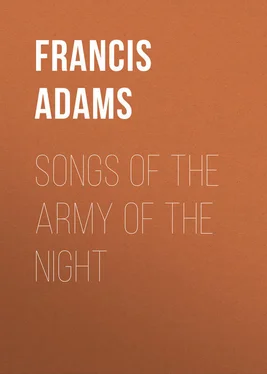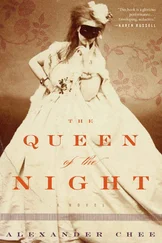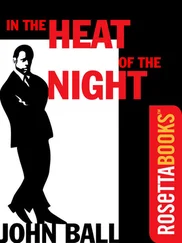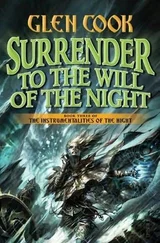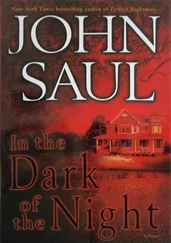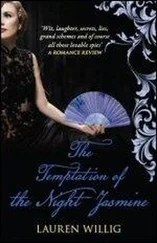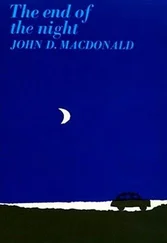Francis Adams - Songs of the Army of the Night
Здесь есть возможность читать онлайн «Francis Adams - Songs of the Army of the Night» — ознакомительный отрывок электронной книги совершенно бесплатно, а после прочтения отрывка купить полную версию. В некоторых случаях можно слушать аудио, скачать через торрент в формате fb2 и присутствует краткое содержание. Жанр: foreign_antique, foreign_prose, foreign_poetry, на английском языке. Описание произведения, (предисловие) а так же отзывы посетителей доступны на портале библиотеки ЛибКат.
- Название:Songs of the Army of the Night
- Автор:
- Жанр:
- Год:неизвестен
- ISBN:нет данных
- Рейтинг книги:4 / 5. Голосов: 1
-
Избранное:Добавить в избранное
- Отзывы:
-
Ваша оценка:
- 80
- 1
- 2
- 3
- 4
- 5
Songs of the Army of the Night: краткое содержание, описание и аннотация
Предлагаем к чтению аннотацию, описание, краткое содержание или предисловие (зависит от того, что написал сам автор книги «Songs of the Army of the Night»). Если вы не нашли необходимую информацию о книге — напишите в комментариях, мы постараемся отыскать её.
Songs of the Army of the Night — читать онлайн ознакомительный отрывок
Ниже представлен текст книги, разбитый по страницам. Система сохранения места последней прочитанной страницы, позволяет с удобством читать онлайн бесплатно книгу «Songs of the Army of the Night», без необходимости каждый раз заново искать на чём Вы остановились. Поставьте закладку, и сможете в любой момент перейти на страницу, на которой закончили чтение.
Интервал:
Закладка:
“See, all these children of ours
Starved and ill-clad.
Speak to thy heart’s lily-flowers,
And make them glad!
“Our wives and daughters are here,
Knowing wrong and shame’s touch
Bid them be of good cheer
Who have lovèd much.
“And we, we are robbed and oppressed,
Even as thine were.
Tell us of comfort and rest,
Banish despair!
“ Be with us by day , by night ,
O lover , O friend ;
Hold before us thy light
Unto the end !”
Yes, let Art go, if it must be
That with it men must starve —
If Music, Painting, Poetry
Spring from the wasted hearth.
Pluck out the flower, however fair,
Whose beauty cannot bloom,
(However sweet it be, or rare)
Save from a noisome tomb.
These social manners, charm and ease,
Are hideous to who knows
The degradation, the disease
From which their beauty flows.
So, Poet, must thy singing be;
O Painter, so thy scene;
Musician, so thy melody,
While misery is queen.
Nay , brothers , sing us battle-songs
With clear and ringing rhyme ;
Nay , show the world its hateful wrongs ,
And bring the better time !
4 4 Something like an adequate account of this great révolution manquée , which in England and 1381 went near to anticipating France and 1793, has at last found its place in the historian’s pages, and Longland the poet, Ball the preacher, and Tyler the man of action, who first raised for us the democratic demand, can be seen somewhat as they were. This, and more, we owe to John Richard Green. An account of the Revolt will be found in section 4 of chapter 5 of his “Short History of the English People.” The phrases in verses 3 and 5 were catchwords among the revolters.
Thro’ the mists of years,
Thro’ the lies of men,
Your bloody sweat and tears,
Your desperate hopes and fears
Reach us once again.
Brothers, who long ago,
For life’s bitter sake
Toiled and suffered so,
Robbery, insult, blow,
Rope and sword and stake:
Toiled and suffered, till
It burst, the brightening hope,
“Might and right” and “will and skill,”
That scorned, and does, and will,
Sword and stake and rope!
Wat and Jack and John,
Tyler, Straw, and Ball,
Souls that faltered not,
Hearts like white iron hot,
Still we hear your call!
Yes, your “bell is rung,”
Yes, for “now is time!”
Come hither, every one,
Brave ghosts whose day’s not done,
Avengers of old rime, —
Come and lead the way,
Hushed, implacable,
Suffering no delay,
Forgetting not that day
Dreadful, hateful, fell,
When the liar king,
The liar gentlemen,
Wrought that foulest thing,
Robbing, murdering
Men who’d trusted them! 5 5 After dismissing the peasants with the formally written acknowledgment of their freedom and rights, Richard II. with an army of 40,000 followers avenged himself and his lords by ruthless and prolonged massacres over the whole country.
Come and lead the way,
Hushed, implacable.
What shall stop us, say,
On that day, our day? —
Not unloosened hell !
Had you lived when a tyrant king
Strove to make all the slaves of one,
With nobles and with churchmen you
Had stood unflinching, pure and true,
To annihilate that hateful thing
Green Runnymeade beat out of John?
Had you lived when a wanton crew,
Flash scoundrels of a day outdone,
Trod down the toilers birth derides,
With Cromwell and his Ironsides
The brave days had discovered you,
Where Naseby saw the gallants run?
And yet you, – this same knight in list
For freedom in her narrow dawn
Against that one, against those few,
Vile king, vile nobles – you, yet you
Stand by the bloody Capitalist,
Fight with the pandar Gentleman!
The stars shone faint through the smoky blue;
The church-bells were ringing;
Three girls, arms laced, were passing through,
Tramping and singing.
Their heads were bare; their short skirts swung
As they went along;
Their scarf-covered breasts heaved up, as they sung
Their defiant song.
It was not too clean, their feminine lay,
But it thrilled me quite
With its challenge to task-master villainous day
And infamous night,
With its threat to the robber rich, the proud,
The respectable free.
And I laughed and shouted to them aloud,
And they shouted to me!
“ Girls , that’s the shout , the shout we shall utter
When with rifles and spades ,
We stand , with the old Red Flag aflutter ,
On the barricades !”
6 6 Who owns, and rack-rents, some of the vilest slums in London, and is beautifully æsthetic in private life.
Sir, we approve your curling lip and nose
At this vile sight.
These men, these women are brute beasts? – Who knows,
Sir, but that you are right?
Panders and harlots, rogues and thieves and worse,
We are a crew
Whose pitiful plunder’s honoured in the purse
Of gentlemen like you.
Whom holy Competition’s taught (like us)
“What’s thine is mine!” —
How we must love you who have made us thus ,
You may perhaps divine !
Man of despair and death,
Bought and slaved in the gangs,
Starved and stripped and left
To the pitiful pitiless night,
Away with your selfish thoughts!
Touch not your ignorant life!
Are there no masters of slaves,
Jeering, cynical, strong —
Are there no brigands (say),
With the words of Christ on their lips
And the daggers under their cloaks —
Is there not one of these
That you can steal on and kill?
O as the Swiss mountaineer
Dogged on the perilous heights
His disciplined conqueror foes: 7 7 The French.
Caught up one in his arms
And, laughing exultantly,
Plunged with him to the abyss:
So let it be with you!
An eye for an eye, and a tooth
For a tooth, and a life for a life!
Tell it, this hateful strong
Contemptuous hypocrite world,
Tell it that, if we must live
As dogs and as worse than dogs,
At least we can die like men!
Tell it there is a woe
Not for the conquered alone! 8 8 “Vœ victis!” woe to the conquered – the motto of the Gauls in Rome as of the modern Civilization of Land and Capital.
An eye for an eye , and a tooth
For a tooth , and a life for a life !
Интервал:
Закладка:
Похожие книги на «Songs of the Army of the Night»
Представляем Вашему вниманию похожие книги на «Songs of the Army of the Night» списком для выбора. Мы отобрали схожую по названию и смыслу литературу в надежде предоставить читателям больше вариантов отыскать новые, интересные, ещё непрочитанные произведения.
Обсуждение, отзывы о книге «Songs of the Army of the Night» и просто собственные мнения читателей. Оставьте ваши комментарии, напишите, что Вы думаете о произведении, его смысле или главных героях. Укажите что конкретно понравилось, а что нет, и почему Вы так считаете.
